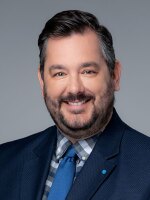Shaun Hanson, 33, may not immediately stand out from the other students in his civil engineering classes at San Diego State University. But he has experience that sets him apart.
“I was in the Marine Corps for seven years," he said. "I was a diesel mechanic fixing HumVs and five tons and mostly troop moving vehicles. I had several deployments, went to Okinawa, Japan, spent six months in Iraq.”
But experiences like Hanson’s don’t necessarily translate easily into a civilian career path. Unemployment rates for the country’s youngest veterans outpace those for their civilian peers, according to a recent report from the Bureau of Labor Statistics. For workers under 24, the unemployment rate was more than 10 points higher for those who had served in the military than those who had not.
Closing that gap was one of the reasons the National Science Foundation funded SDSU’s pilot Tropps to Engineers SERVICE Program.
Patricia Reily, a former Navy commander, heads the program, which places the engineering school’s veterans in paid internships.
"There’s a good body of research that says if you can get a student into an internship it enhances their chances to get a follow-on job in their chosen career field,” Reily said.
And She believes San Diego is the perfect place to put that research to the test.
“We are at ground zero for veterans leaving the military," she said. "We have more veterans, more active duty leaving the military than any other city in the country. And, the need we’re meeting – what I remember, and I joined the Navy at the end of Vietnam. What I remember at the University of Minnesota was that veterans – there was no place for them.”
Reily came to SDSU knowing she would network to find internships for veterans. She has placed 33 since she started 14 months ago. What she didn’t know was that her office would turn into a kind of clubhouse. Her students stop by to talk about a worrisome test, vent their frustrations or get help rewriting resumes so their military accomplishments make sense to civilian employers.
She sometimes thinks of herself as Commander Mom. And she’s obviously proud to say that all of her students who have completed their internships have been asked by the companies to stay on.
Hanson interns at Kevcon, a general contracting company in Escondido. He works in the estimating department where he deals with contractors and figures out how much projects will cost.
“Just by being able to see drawings of buildings and know the process and know where work is actually acquired from and being familiar with federal work because that’s a big part of the civil engineering field," he said. "So being familiar with the process and seeing how that works has been a really, really good asset for me to learn.”
Kevcon Founder Kevin Kutina said his own experience leaving the Marines made him eager to help other veterans make it in their civilian careers.
“I know when I was in school and did my time in the Marine Corps and got out I had a very difficult time finding work," he said. "Because a lot of people said – 'meh, you were in the Marine Corps so you didn’t learn something applicable or you were too far out of college, so what you learned in college wasn’t applicable anymore.”
Hanson’s military service isn’t his only distinction from his younger classmates. He’s a father and Kutina beleives that makes placing veterans in flexible, paid internships even more important.
“A lot of them that go through that system are married and have kids," he said. "So, it’s also a little bit more difficult on them, too. They’ve left the military with some good paying jobs, steady income. And now they’re going to school, a little bit struggling and now they’ve got to find a work place that’s flexible for them.”
The support Hanson has gotten gotten at SDSU and Kevcon can make sometimes stressful mix of family, work and school easier to cope with.
“I know that I can always go back to a fellow veteran and get help, that’s nice to have that support structure – just like in the military," he said. "You always had someone you could go to to get assistance with one of your problems. So to know that that’s there if something does arise, it’s comfortable. It’s a good feeling to know that somebody has your back.”
By the end of the semester, Reily, the SERVICE Program director, hopes to bring the number of veterans getting the kind of experience and support that Hanson has to 50.







